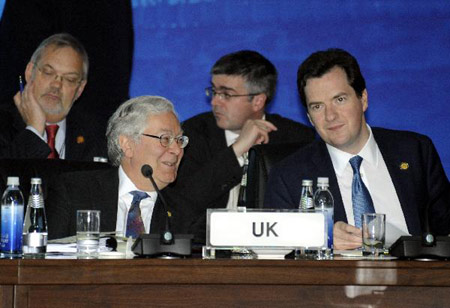Special
G20 ministers urge more financial reform
(Xinhua)
Updated: 2010-06-07 13:27
 |
Large Medium Small |
|
 |
|
British chancellor of the exchequer George Osborne (R, front) and Britain's Central Bank Governor Mervyn King attend the G20 Finance Ministers and Central Bank Governors Meeting in Busan, South Korea, June 5, 2010. The meeting of the G20 finance ministers and central bank governors continued here on Saturday. [Xinhua/Pool] |
BUSAN - The meeting of the G20 finance ministers and central bank governors on Saturday ended in South Korea's southeastern port city of Busan, leading to a joint communique calling for member countries' continued efforts on financial reform.
In the face of the lingering eurozone fiscal debt risks, financial leaders of the 20 member countries had in-depth discussions on cooperative measures to boost up fiscal soundness and spent time on developing a basket of policy options to be brought up to the discussion table at the Toronto Summit.
The two-day meeting drew up a joint communique signed by participant leaders, although there have been some thorny issues, such as a global bank levy, accompanied by disputes among participant leaders.
South Korean Financial Minister Yoon Jeung-hyun, wrapping up the meeting, highly exalted the event, saying it succeeded in reaching an agreement despite discords among the participant countries on some issues.
"With respect to the content of the communique, we have reached an almost-perfect result without major disputes, which I think is the most outstanding outcome of the meeting," Yoon told the closing press conference.
Joint communique
The joint communique was founded on the Framework for Strong, Sustainable, and Balanced Growth, which is a key mechanism to meet the immediate challenges of supporting the global recovery and mid- term shared objectives.
Based on the framework were adopted a range of policy options that will later be discussed in details at the June 2010 Toronto Summit, according to the communique.
The leaders agreed on further progress on financial repair, requiring greater transparency and further strengthening of financial firms' balance sheets and better corporate governance.
They also vowed to speed up in reaching agreement on stronger capital and liquidity standards as the core of the reform agenda, calling on the Basel Committee on Banking Supervision to propose internationally agreed rules to improve the quantity and quality of bank capital.
The proposal also urged to discourage excessive leverage and risk taking by the November 2010 Seoul Summit, the communique said.
The communique also remarked on the World Bank's reform voice to increase the voting power of developing countries, while protecting the smallest poor nations, embracing the proposal.
The agreement also called for continued institutional reforms at international financial institutions (IFIs) led by the World Bank.
Constructing global financial safety nets was also one of the major items on the communique, with the G20 countries acknowledging a need for national, regional and multilateral efforts to deal with capital volatility and prevent crisis contagion.
However, bank levy, the core of the disputes, was not elaborated in detail in the communique, only endorsed as a need for a fair and substantial contribution towards paying for any burdens to repair the banking system or fund resolution.



